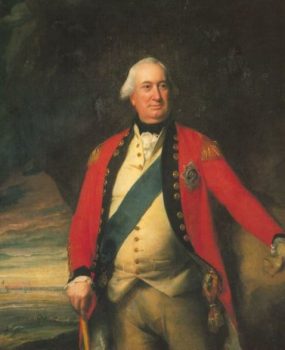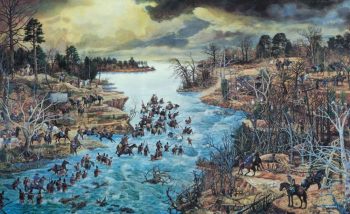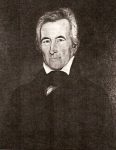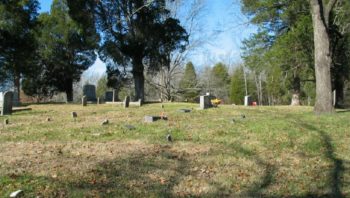If you have a family connection to Haynes Cemetery in the Scribner’s Mill Community of Maury County, be proud. A few heroes and patriots lie there – including two Revolutionary War soldiers, at least five Confederate veterans, and several who served honorably in more recent wars. There also are those who were just plain, good, wonderful, kind, hardworking, church-going people – and more than a few exceedingly colorful country characters.
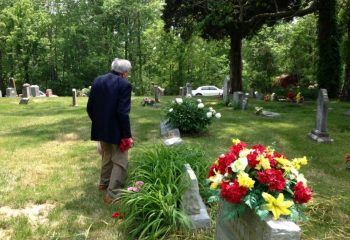
Decoration Day, Mother’s Day: Jack White puts flowers on his grandmother’s grave — Ophelia Tennessee Davidson White, wife of James Lewis White, Company F, 1st Tennessee Cavalry.
Likely as not, if you’re related to one person who rests here, you’re related to several. It’s worth getting on Ancestry.com and exploring your ties to this old place.
The cemetery is named for Joseph Haynes (1749-1845), a true pioneer and brave Revolutionary War soldier whose great-great grandfather William sailed from Renhold, Bedforshire, England to settle in Salem, Massachusetts in 1644.
Generations later, in 1752, when Joseph was three years old, his father James journeyed with two brothers and a group of kinsman to what was then the outskirts of western civilization, to the edges of Cherokee country, the Catawba Valley of the colony of North Carolina. There they built an isolated frontier fort and defended themselves against a steady onslaught from Indians who were not keen on Manifest Destiny and the western migration of white people. Despite danger and hardship, the community grew and prospered.
In writing about Joseph’s mother Anne Huggins Haynes in Pioneer Women of the West (Charles Scribner, publishers, 1852), author Elizabeth Fries Ellet tells of the family’s life on the frontier:
…At this time there were so many buffaloes in this region, that a good hunter could easily kill enough in a few days, to supply his family for the year. Wild turkeys, bears, deer, wolves, and panthers, were also abundant. Every little mountain stream abounded with otters, beavers, and musk-rats. Each pioneer could raise as many head of cattle as he thought proper; the profusion of canes and grasses, rendering stock-raising so easy, that the means of plentiful living was almost to be had without labor. A few skins usually sufficed to purchase upon the seaboard all the necessary supplies of iron, salt, etc., for the year.
This kind of life, requiring the daily use of the rifle, and much exercise on horseback, and exposure to the open air in the woods, made these hardy men the best of soldiers, and enabled them to cope with the wild warriors of the savage tribes who dwelt on their borders. The axe, and the rifle, and the horse, were their constant companions.
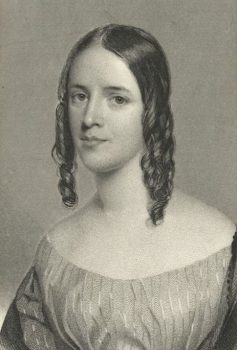
Elizabeth Fries Ellet was the first author to write about women patriots of the American Revolution.
The Haynes men were well-conditioned for warfare when the Revolution came. Joseph, two brothers, and a brother-in-law Captain James Scott took up arms against the British at the very beginning of hostilities. Joseph first served under Colonel (later Brigadier General) Griffith Rutherford beginning in 1775 and fought in the initial phases of the Cherokee-American Wars. He later fought in the Battle of Ramsour’s Mill, Beaty’s Ford, and Cowpens.
On February 1, 1781, the war came to his very doorstep as the British General Cornwallis, advancing toward Charleston, passed through Catawba Valley with 5,000 men. At Cowan’s Ford on the Catawba River, they met an American force one-fifth their strength which included the Haynes sons and Captain Scott.
The British were stopped and this was considered a turning point of the war, leading to the surrender of the British at Yorktown.
Joseph Haynes was in the company which led the charge against the British, commanded by Captain John Dickey. At one point, in the heat of the fight, Dickey was ordered to retreat but “…refused to quit his post bravely fighting Sword in hand until the line which was broken and driven back was restored and the Battle gained.”
Dickey and Joseph were near General William Lee Davidson when he was felled by a musket ball. Sadly, Captain Scott also perished in the skirmish.
The author Ellet recounts what happened afterward:
…Soon after, the British passing, as already mentioned, near the house of the elder James Haynes, stopped and plundered it, took him prisoner, and boasted in the hearing of his family, that they had killed his son-in-law at the Ford, hinting that his sons also were either killed or captured. The old man was over sixty, and in feeble health; his venerable appearance and Quaker habiliments should have secured their respect, but the crime of sending so many brave sons to battle was not to be forgiven. Family tradition, confirmed by the recollection of his daughter-in-law, states that they pulled off his coat, overcoat, and silver knee and shoe-buckles, and made him dismount and walk on through mud and water, urged forward by the prick of bayonets ; also that the news of his capture and the pillaging of his house was carried to his sons by his daughter
Hannah, who made her way through bypaths for forty miles, eluding the marauding parties scattered through the country, to the American army. Her brother’s immediately set off in pursuit, found their father at length by the roadside, watched over by a wounded American soldier, and conveyed him home.
James Haynes soon died from his mistreatment (when first arrested, he spent a cold February night in a corn crib with other prisoners “without blanket or fire”).
The sons, however, went on to fight in “glorious battles, in which Tarleton, and Ferguson and Conwallis were soon after so signally defeated in the Carolinas.”
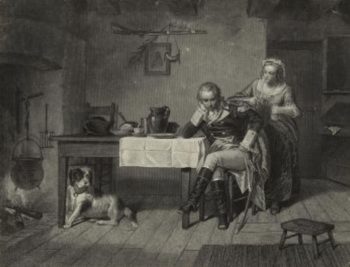
After the Battle of Cowan’s Ford, General Nathaniel Greene learns of General Davidson’s death. Not yet aware of the significance of the defensive action at the Ford, Greene confides to his doctor that he is “fatigued, hungry, alone and penniless!” Overhearing the conversation, Elizabeth Maxwell Steele gives two bags of coins to the General to supply his troops. Her selfless act of patriotism inspires him to lead his men to victory in the battles to come.
After the war, in 1806, Joseph brought his family to Maury County and was followed in 1813 by his friend and old comrade in arms John Baldridge. Baldridge was Captain of a Volunteer Company of Riflemen from Lincoln County, North Carolina and served in several battles such as Cowan’s Ford with Haynes. He was the first to be buried at Haynes Cemetery in 1823 on land which is said to have belonged to Joseph Haynes.
Elizabeth Ellet writes of Joseph…
…Joseph and James [his brother], were with Gates and Greene, and in many of the most trying scenes of the war. Joseph was one of the first who broke the cane and hunted the buffalo in the valley of Duck River, Tennessee. He was a brave soldier and an ardent patriot. It was his boast, that of all his kinsmen who were able to bear arms, there was not one who did not fight on the side of the Republic.
When Joseph died in 1845 at the age of 96, Melvin Andrews Haynes wrote his obituary. Melvin was the grandson of Joseph’s brother John. He was a graduate of West Point Class of 1838, subaltern in the Florida War, and Captain of Tennessee Volunteers in the Mexican War. Like many of his Southern classmates, he took up arms for the Confederacy when war was declared. He served as a Colonel in the Tennessee Artillery Corps.
Here is an excerpt from the eulogy:
Until within a short time before his death, he was able to walk and ride as usual; and though advanced beyond the age usually allotted to man’s existence, he never lost the vigor of intellect, nor the manliness of carriage, which characterized his earlier years.
Few men have lived so long and worthily; and it cannot but be a source of gratification to his numerous family and relatives, that he had lived, a devoted and humble Christian.
He had passed through a long pilgrimage, had seen much sorrow and been visited by many trying dispensations of providence; yet he triumphed over them, all, over exhibiting an example of dignified and patient submission to whatever visitations of misfortune might befall him: and well might he have said, in view of the events of his own life, “The way was long, my children, long and rough. But he that creeps from cradle down to grave, Unskilled, save in the velvet walks of fortune, Hath missed the discipline of noble hearts.”
Haynes Cemetery is a sacred place. My great-grandparents, my grandparents, uncles, and aunts, and many other kinsmen rest there, on a high green hill, among ancient cedars and noble hearts.


